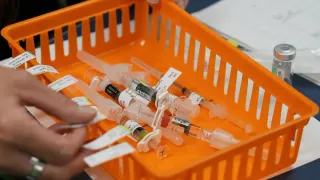March 30, 2019
Tribes Urge U.S. to Put Off Oil, Gas Leases Near Sacred Sites
Susan Montoya Bryan READ TIME: 3 MIN.
Tribal leaders are calling on U.S. land managers to put off an upcoming oil and gas lease sale, the latest in an ongoing battle over energy development in a region that's home to a national park and other sites of cultural and historical significance.
The tribes say the federal government is obligated to follow environmental and historic preservation laws when considering whether to allow for oil and gas exploration in northwestern New Mexico. They're concerned about more than two dozen parcels that will be up for bid Thursday.
The massive stone structures that make up Chaco Culture National Historical Park and other sites scattered beyond the park's boundaries are important to Native Americans from around the Southwest and archaeologists who have spent decades trying to unravel the mysteries of the centuries-old gathering spot.
In asking the Bureau of Land Management to defer the lease sale, the All Pueblo Council of Governors renewed its call for formal protections to be included in a plan being drafted by that agency that will govern future development throughout the San Juan Basin.
Acoma Pueblo Gov. Brian Vallo on Wednesday accused the agency of doing little to identify "critical and fragile cultural properties" in the basin, which spans much of northwestern New Mexico and parts of southwestern Colorado.
Vallo said the lease sales are "inconsistent with the goal of the field office to complete a holistic plan for energy development while acting as stewards of that sacred landscape."
The agency is planning to go forward with the sale, and agency spokeswoman Cathy Garber said a draft of the amended management plan is expected within the next few months.
In recent years, land managers have declined oil and gas exploration on land within a 10-mile (16-kilometer) radius of the park, creating somewhat of an informal buffer. In early 2018, then-Interior Secretary Ryan Zinke halted a lease sale over cultural concerns after hundreds of people protested.
In February, the agency again decided to withdraw several parcels that had been nominated by the industry for inclusion in the sale.
The battle over energy development around Chaco, which is bordered by the Navajo Nation and a checkboard of state and federal land, has been simmering for years. Officials with the Obama administration and Democratic members of New Mexico's congressional delegation visited the region in 2015 in hopes of brokering a way forward for the tribes and energy companies.
The Bureau of Land Management and the Bureau of Indian Affairs then began working together on revamping the resource management plan. The partnership was meant to ensure tribes would be consulted and that scientific and archaeological analysis would be done to guarantee cultural sensitivity.
"Until this area is permanently protected, we are living in a state of uncertainty and doubt as the BLM prepares its plan amendment," said Michael Chavarria, the governor of Santa Clara Pueblo. "Our cultural sites and ancestral homelands are put in danger every time BLM engages in these sales because it encourages haphazard development."
A UNESCO world heritage site, Chaco park includes the remains of kivas and other features of a ceremonial and economic hub that dates back centuries. Archaeologists believe the site offered a religious or ritualistic experience as many of the structures are aligned with celestial events, such as the summer solstice.






